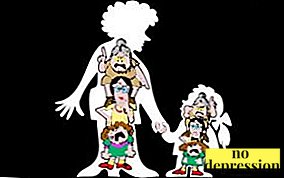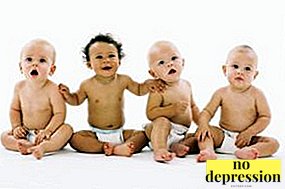Each person in his physical development undergoes several states: a child, an adult and a parent.
At the same time should grow and his psychological state.
However, often people in adulthood behave like children and vice versa.
Because of this, misunderstandings, conflicts in the family and at work occur. The answer to the question why this happens gives transactional analysis.
Transaction analysis

Transactional analysis is called psychological modelwhich is used to analyze personal interaction in groups and its individual behavior.
Transactional analysis is based on principles psychoanalysis, but unlike the latter, describes the behavior and reactions of a person in simple accessible language.
Transaction, in terms of psychology, is interpersonal interaction unitconsisting of a send (stimulus) and reaction to it.
That is, human communication is nothing more than an exchange of transactions. For example, a greeting and an answer to it, a question and a response.
The following transaction types are distinguished.:
- Complementary. The outgoing stimulus from one person is complemented by the response of another. For example: "What time is it?" - Two hours. Both people communicate in the same condition.
- Cross. The message intersects with the reaction. On this build most of the scandals. So the husband asks the question: “Where is my shirt?”, And in response he hears: “Why should I know this?”. That is, the husband speaks from the position of an adult, and the wife responds from the position of the child.
- Hidden. This is the case when words do not coincide with emotions. The individual says one thing, and his emotions and facial expressions speak of something else. Psychological games are based on this.

Transactional analysis is designed to answer the question why the same person in different situations shows different behavior and reacts differently to stimuli.
This is due to the use of one of the three states.
With this analysis, you can learn to understand the behavior of other people, to make decisions, to demonstrate their emotions and feelings. Transaction Principles used in the following areas:
- when interacting in teams;
- to build a family model;
- with friendly communication;
- in raising children.
In a word, transaction techniques are used in all areas of interpersonal interaction.
Theory of E. Bern

The founder of the theory of transaction is considered to be American psychotherapist Eric Bern.
He began to publish his work in the 60s of the 20th century, the greatest interest in his work occurred in the 70s.
His observations and development of Bern reflected in the book "Games People Play". The author by the word "transaction" means a unit of interaction, which is expressed as follows: question-answer.
According to Bern’s theory, three states interact in each personality: child, adult and parent. The same person at different times may be in different states.
If a person follows the attitudes given to him by his parents, he is in a state of parent. When he behaves, as in childhood, a child presses over him. With an objective assessment and acceptance of reality, analyzing the current situation, a person is in an adult state.
Within the framework of transaction theory, Bern developed the theory of the scenario. Each person can execute a prescribed script or apply an anti-scenario.
The script called a life plan, which is drawn up in early childhood. So many children know what they want to become, how many children to have and where to live.
Scenario can be imposed and parents. If the child is constantly told that he is a loser, he will not succeed in life.

The counter scenario is formed already in adulthood and implies a departure from the prescribed plan.
For example, parents and teachers “predicted” a teenager to be a doctor, like his grandfather or dad, to continue dynasty.
However, a person takes all actions to get away from the “destined” fate.
Antiscenary is the exact opposite of the scenario and involves the performance of sequential actions opposite to those to be performed.
That is, instead of passing exams and going to college, a young man leaves school and gets into bad company, starts drinking and taking drugs.
His behavior is also a consequence of the attitudes of the parents, but with the opposite result.
State Characterization
According to the pattern of behavior according to Bern, each individual in interpersonal interactions occupies one of three positions.

Briefly, they can be described as follows:
- parent - These are stereotypes grafted in childhood;
- adult - this is an objective assessment of the current situation;
- child - behavior based on emotions and unconscious reactions.
Parent position
A man in this state is like himself pompous experience, forces, criticizes, teaches. This is a reflection of the image of parents, their behavior patterns.
The main word of the ego state is the parent “must, must”. A parent can be caring, then he calms, helps and criticizes, which threatens, punishes.
Person utters characteristic phrases: “I know the best way”, “I will tell, I will teach”, “It’s not possible”, etc. This behavior is usually applicable to the upbringing of children, in the work of a teacher.
Often the individual enters the state unknowinglywhen receives the corresponding promise. For example, the reaction to a toy broken by a child will be the same as its parents had.
Adult position

If the individual is in this state, he is reasonable, objective, adequately responds to the current situation, is able to reason, does the right thing, worthy of an adult.
Typical phrases are: "Let's discuss the situation", "I am ready for dialogue", "You can find the right solution."
This is the part of the personality that the person himself forms without the influence of parental attitudes.
Baby's position
Personality behavior due emotions and instincts. That is, a person behaves as in childhood.
This ego state is a reflection of the fears and experiences of childhood. It also manifests the creative side of personality.
In behavior, a child can be spontaneous, when acting on emotions, directly. Also happens to be rebellious and adaptable. Basic phrases: “I want”, “I can’t”, “Give”, “Why I”, “If I don’t get it, then ...”, etc.
Functions

No one can not always be in one state.
When exposed to certain stimuli, certain aspects of the personality are “turned on”. It is important which ego is predominant.
All three states are important for interpersonal relationships and perform certain functions:
- Child's task - it is creation, creation of an emotional image of desires, which will be a stimulus for further development. The child acts spontaneously, creates, gives rise to ideas.
- Parent task - custody, training, instruction. Monitoring compliance with the rules, assistance, constructive criticism.
- Adult's task - adaptation to the current situation, finding a solution, constructive dialogue. In other words, he must act in accordance with objective reality.
For example, decision-making happens as follows:
- the child feels like getting something, feels emotions;
- an adult is looking for ways to solve the problem;
- parent monitors the correct execution, criticizes, directs, evaluates.
Problem and signs of imbalance
A person can achieve success and prosperity if three ego components harmoniously interact in it. For every condition should account for about 30% of his time.
If you know the principles of a transaction, then you can include a child, adult or parent in the right situation, so that the communication goes according to the desired scenario.
Unfortunately, not everyone has this balance. This leads to various communication problems. Most often in the individual is dominated by the parent or child.

Child cannot make adult decisions, is late for work, blames others for failures, takes offense.
Parent all the time lectures the other half, friends, partners.
These excesses adversely affectabove all, on the person himself. Imbalance problems are expressed in the following:
Child
If a in the personality of a little childthen she does not experience spontaneous desires, joy, emotions. A child is a piece of childhood that stays with an individual for life.
Bern believes that this side is most valuable. It allows you to remain direct, enthusiastic, to develop creativity.
Child's pronounced sideon the contrary, makes the individual irresponsible, undisciplined, unable to achieve the goal. He wants only to play, to receive, but not to give.
Depressed or rebellious child is very touchy, prone to depression. He needs parental care, depends on the opinions of others, has a low self-esteem.
If the ego child dominates stronglythen this becomes a serious problem. A person is inclined to blame for the failures of other people, does not draw conclusions from his mistakes, accumulates resentment. These insults and disappointments lead to depression, depression, suicidal thoughts.
Hypertrophied parent

This is usually a boring, grumbling, teaching person.
He does not recognize the opinions of others, criticizes. In relation to himself and others expresses excessive demandsi.e. is a perfectionist.
The ego-parent tries to constantly control the situation, blames himself for failures. Too pronounced this side of the person often causes mental disorders. This can be avoided by consciously redoing the script prescribed in childhood.
Adult problem
The adult’s problem is that this side too rare. Not everyone is able to adequately assess reality, make the necessary decision, accept constructive criticism, make a compromise.
True, the state of an adult can and should be developed and increased. For example, a person is offended by a conflict. He should analyze the situation and understand whether the interlocutor really wanted to offend him or whether this ego child was emotionally offended.
Often skillful manipulators try to evoke a child’s emotions in order to reach your goal.
The next time, when a conflict occurs, it is necessary to “turn on” the adult and “turn off” the child, that is, not to fall on the hook of the manipulator.
So a mature person can be considered if a balance is reached between the three sides of the ego. The immaturity of one of the parties, and the dominance of the other become a source of psychological problems.
Three ego states. Your first "I":



